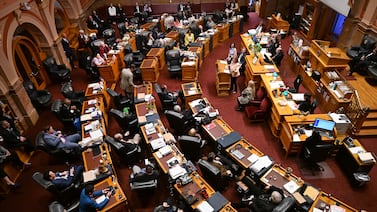Sign up for Chalkbeat Colorado’s free daily newsletter to get the latest reporting from us, plus curated news from other Colorado outlets, delivered to your inbox.
With some exceptions, most of Colorado’s undergraduate teacher prep programs spend enough time training future elementary school teachers to teach math, according to a new report.
Just over half of Colorado universities that received ratings in the National Council on Teacher Quality report released Tuesday earned an A or A+ for their undergraduate prep programs. They include the University of Northern Colorado, which is the state’s largest teacher prep program, and the University of Colorado Colorado Springs, which is the state’s third largest program.
The state’s second largest teacher prep program, Metropolitan State University of Denver, earned a C. Adams State University in Alamosa was the only undergraduate prep program in the state to earn an F. Both universities sent identical statements to Chalkbeat — each credited to a different administrator — saying the state is the most legitimate judge of teacher prep program quality.
The National Council on Teacher Quality, a research and advocacy group, used syllabi and course descriptions to determine its grades. The Colorado Department of Education doesn’t give grades to prep programs, but it does reauthorize them every five years. During that process, department staff visit campuses and review a variety of data. The department has only recently begun taking a harder look at how prep programs cover math.
In contrast to the undergraduate program grades, all but one of Colorado’s graduate teacher prep programs earned a D or F from the council for how they train future elementary teachers in math.
The council’s report comes at a time when both state and national leaders are concerned about K-12 students’ math performance, particularly since schoolchildren haven’t fully rebounded from the pandemic. Colorado fourth graders made significant gains in math on recent National Assessment of Educational Progress tests, hitting 42% proficiency, compared with 36% in 2022. Still, they’re still below the 44% proficiency rate fourth graders achieved in 2019.
For two years, Colorado has paid for schools to use an online math tutoring program called Zearn, which may have contributed modestly to math gains, a recent study found. State officials are also taking a closer look at how teacher prep programs approach math education — though not to the level they’ve scrutinized teacher prep programs’ approach to reading instruction.
Starting in spring 2023, the Colorado Department of Education began meeting with math faculty during campus visits in advance of teacher prep program reauthorization. In December, department officials began reviewing how teacher prep math classes align with state math standards. The results will be shared privately with universities this summer, a department spokesperson said.
The new ratings of more than 1,100 teacher prep programs nationwide from the National Council on Teacher Quality are based on whether programs spend enough time — 15 to 45 hours — covering key math topics. The topics include numbers and operations, algebraic thinking, geometry and measurement, data analysis and probability, and math pedagogy, which focuses on how teachers teach math to students.
Kim Mahovsky, an assistant professor of teacher education at the University of Northern Colorado, said her university’s A grade for its undergraduate program is well deserved.
She said elementary education students are required to take three math courses, and students with an elementary math concentration will take at least one additional math course.
“We are very proud of the fact that we require our students to have all these math courses in order to teach elementary mathematics,” said Mahovsky, who teaches various math methods classes.
She said the number of instructional hours the National Council on Teacher Quality recommends for various math topics all made sense to her, except for geometry and measurement. The council’s 25-hour benchmark seemed “a little low,” she said. A typical 3-credit college class is equivalent to about 45 hours of instruction.
Mahovsky took issue with the council’s F grade for her university’s graduate program for future elementary educators. She said the grade doesn’t take into account that to gain admission, students in that program must have taken the three math courses required in the university’s undergraduate teacher prep program or, if they attended a different college for undergrad, equivalent classes.
“They should already have that foundational concept knowledge coming into a graduate program,” Mahovsky said.
Some Colorado universities didn’t want to discuss the council’s teacher prep program math grades. Metropolitan State University of Denver declined two interview requests from Chalkbeat.
A statement attributed to Liz Hinde, dean of the School of Education, said in part, “While we recognize the right of external agencies to review our programs and welcome anyone to visit our website and gather whatever information they would like from it, we believe that the State of Colorado is the most legitimate judge of the Educator Preparation Programs at Metropolitan State University of Denver.”
When asked why the statement mirrored one from Adams State University, a spokesperson for Metropolitan State said Hinde crafted the statement in collaboration with the Colorado Council of Deans/Directors of Education and shared it for any of the group’s members to use.
Ann Schimke is a senior reporter at Chalkbeat, covering early childhood issues and early literacy. Contact Ann at aschimke@chalkbeat.org.







